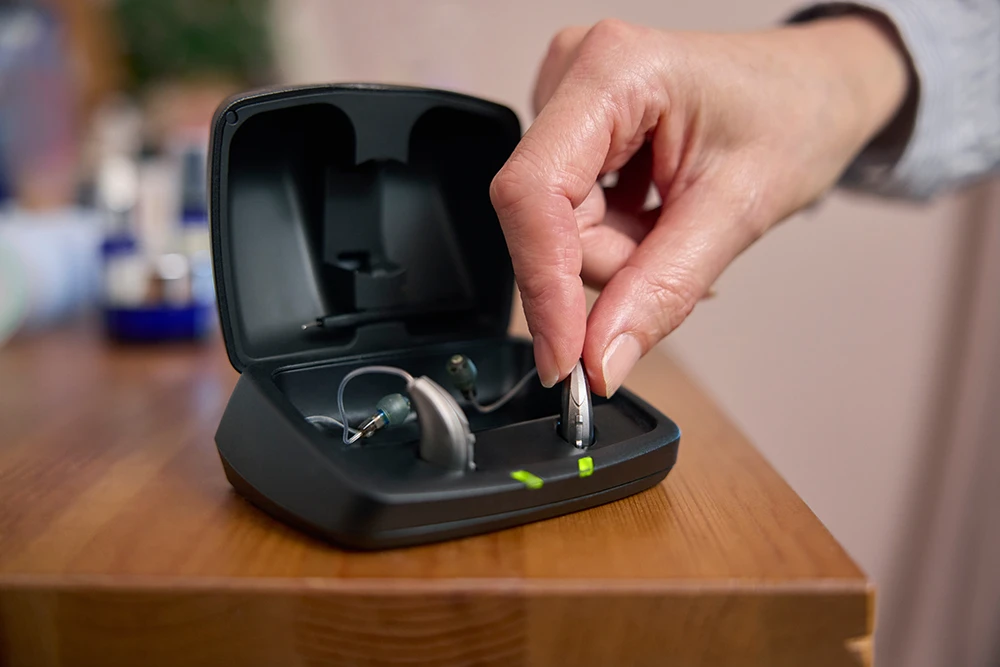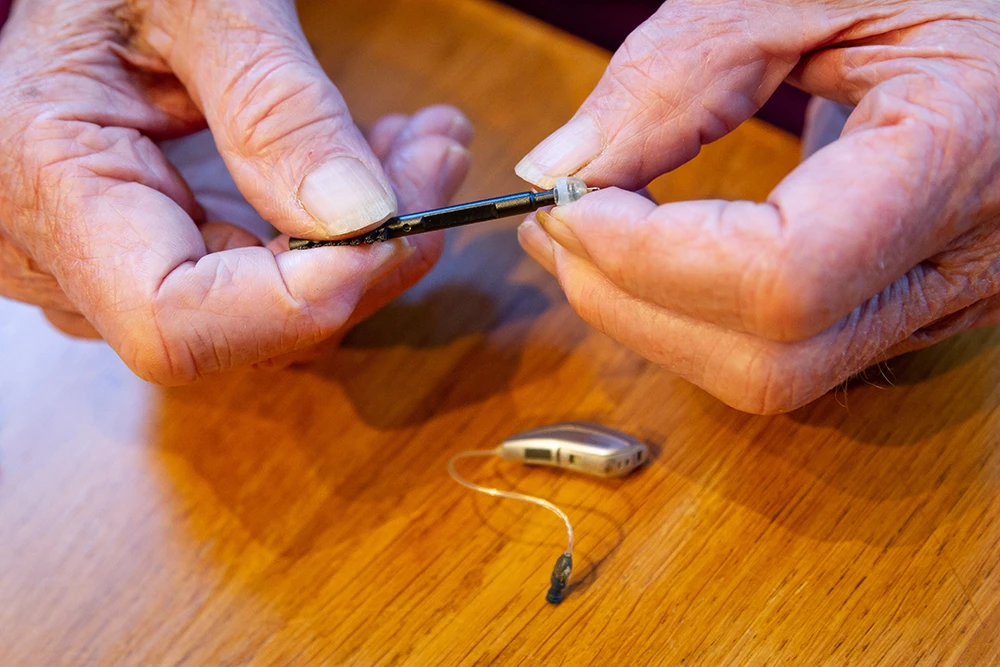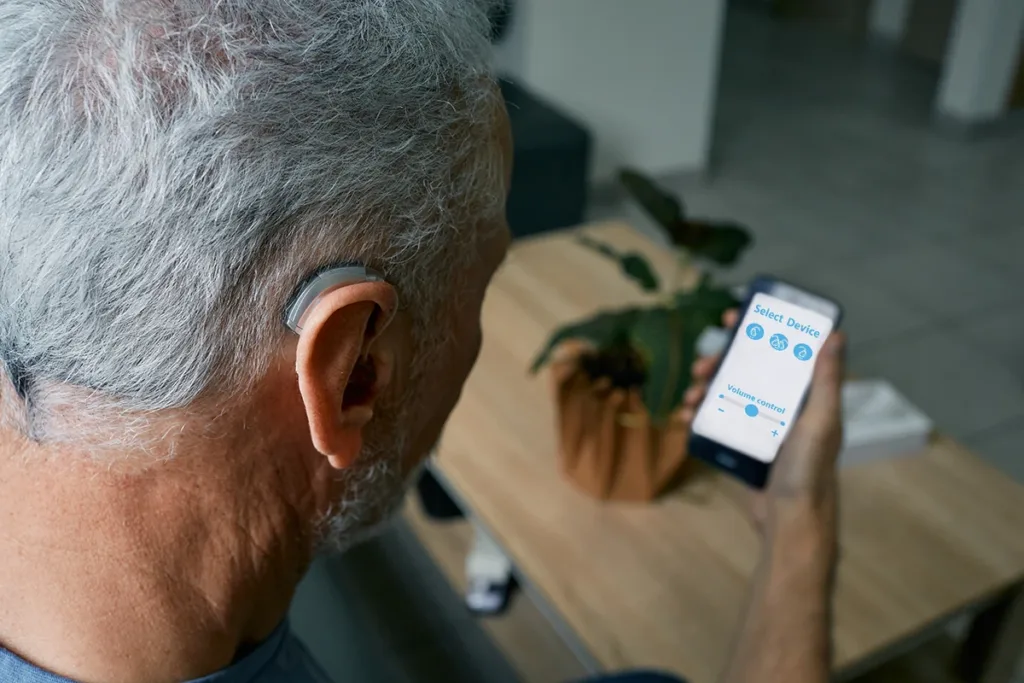Hearing Aid Use and Care
Hearing aids are essentially small, sensitive computers that you wear. And like any computer or electronic device, it’s important to practice proper use and care. Proper hearing aid use and care helps ensure an optimal user experience and extends the life of your hearing aids.
Hearing Aid Use
How you use your hearing aids is just as important as why you use them in the first place. The way you use your hearing aids can dramatically affect your overall user experience. Failing to use your hearing aids properly or consistently can bar you from hearing your best and preserving what hearing you have remaining. So, let’s review proper hearing aid use.
Ensure your hearing aids are in correctly
It’s important to wear your hearing aids properly for maximum comfort and the best sound quality. If your hearing aids are not correctly inserted, you may experience less than optimal sound. Try inserting your devices in front of a mirror so you can see exactly where and how the hearing aid is sitting.
Not sure if you’re wearing your devices correctly? Visit an Audibel hearing specialist. They’ll be more than happy to show you how to wear them.
Wear your hearing aids all day every day
Hearing aids are designed to be worn comfortably all day long. Of course, if you’re new to hearing aids, this can be a learning process. Some users may begin by wearing their hearing aids for a few hours at a time before building up to all day use, whereas others are able to jump right into a full day of use.
And remember that to get the best experience, wear your hearing aids all day every day. If it helps, consider setting an alarm in the morning and the evening to remind you to put your devices in and take them out.
Practice active listening
Especially in noisy environments like restaurants, it’s important to engage in active listening. Active listening can help strengthen your brain’s association between sounds, voices, body language and memory. Pay attention to the speaker when they are talking and reflect on what’s being said so you can retain that information for later.
In this way, you can learn how to tune out extra noises that may be less important and concentrate better on the sounds that do matter, like people’s voices.
Use the correct settings
When you first receive your hearing aids, your hearing specialist will adjust the settings to suit your prescription and needs. They will also review additional settings that you can adjust on your own including the volume as well as any specialized preset memories.
It’s important to pay attention to when and where these memories are best suited. Some settings are designed for noisy environments, while others are designed for communicating with individuals wearing masks. Using these specialized settings properly can help you hear your best in challenging situations.
For additional information, see our Hearing Aid Troubleshooting Guide.
Hearing Aid Home Care
Maintaining your hearing devices through daily cleaning and regular service is extremely important. Your ear is a very warm and very moist place that naturally produces earwax as a self-cleaning mechanism. Heat, moisture and earwax can all cause damage to your hearing aids, which is why hearing aid home care is crucial to optimal device performance.
Cleaning your hearing aids
While your ear may be a self-cleaning machine, your hearing aids are not. That’s right; ear wax, aka cerumen, is a good thing…for your ears that is. Ear wax helps keep your ears clean of debris. Unfortunately, ear wax is not so great for your hearing aids. Ear wax buildup can result in suboptimal hearing aid performance as well as damage to the sensitive technology housed within. Therefore, it’s important to regularly clean your hearing aids at home at least once a day.
Hearing aids and water exposure
Many of today’s hearing aid models are water-resistant. The Signature Series, for instance, is virtually waterproof*. However, while these models are designed to be water resistant, they are not intended for use in the water. So please don’t wear your hearing aids while:
Bathing or using the sauna
Swimming
Using a hair dryer
Applying hair spray or other spray-on products
*Tested in up to 3 feet of water.
Storing your devices
Whenever you are not actively wearing your hearing aids, it’s important that you store them either in their case or in a dehumidifying box. Hearing aids are small, sensitive devices that are vulnerable to heat, moisture and physical damage. Use the storage case that your hearing aids came with, if possible, especially if your devices are rechargeable.
Pro tip: When not in use, leave your hearing aid’s battery door open to preserve battery power.
Comprehensive Care At-home and In-office
With proper care and use, your hearing aids can help you hear your best again. Of course, even with the best at-home care, it’s still important to schedule regular check-ins with your hearing specialist. They can give your devices a deep clean that you simply can’t do at home, go over any changes to your hearing, and even diagnose problems with your devices.

Additional resources
Taking proper care of your hearing aids can be overwhelming for those new to them. Check out some of our additional resources for everything from frequently asked questions to step-by-step instructions on how to troubleshoot common issues.

Frequently Asked Questions

Product Manuals

Maintenance and Troubleshooting
